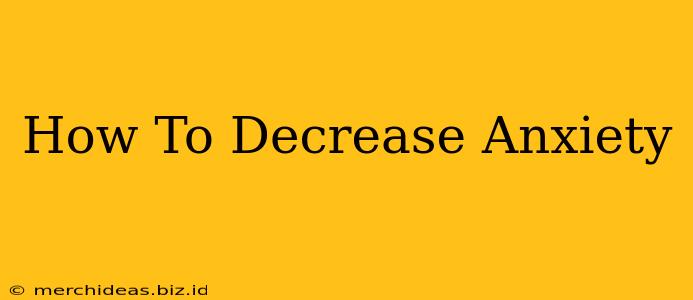Anxiety. That persistent feeling of unease, worry, and nervousness that can impact every aspect of our lives. If you're struggling with anxiety, know that you're not alone. Millions experience it, and there are effective ways to manage and decrease it. This guide offers practical strategies to help you find more calm and peace in your daily life.
Understanding Your Anxiety
Before diving into solutions, it's crucial to understand the root of your anxiety. Is it situational (related to a specific event or trigger), or is it more generalized? Identifying the source can help you tailor your approach. Keeping a journal to track your anxiety levels, triggers, and potential contributing factors can be incredibly helpful. Consider what situations, thoughts, or physical sensations precede your anxiety. This self-awareness is the first step towards managing it.
Practical Techniques to Decrease Anxiety
Here are some proven techniques to help you decrease anxiety:
1. Mindfulness and Meditation:
Mindfulness involves paying attention to the present moment without judgment. Simple practices like deep breathing exercises can significantly reduce anxiety symptoms. Focus on your breath, noticing the sensation of the air entering and leaving your body. Count your breaths or use a guided meditation app.
Meditation takes mindfulness a step further, often involving a quiet space and a focused attention on a specific object, sensation, or thought. Regular meditation practice can calm the mind and reduce feelings of overwhelm. Even 5-10 minutes a day can make a difference.
2. Physical Activity:
Exercise is a natural anxiety reliever. Physical activity releases endorphins, which have mood-boosting effects. Find an activity you enjoy, whether it's a brisk walk, yoga, swimming, or dancing. Aim for at least 30 minutes of moderate-intensity exercise most days of the week.
3. Healthy Diet and Sleep:
What you eat and how well you sleep significantly impacts your anxiety levels. A balanced diet rich in fruits, vegetables, and whole grains provides the nutrients your body needs to function optimally. Avoid excessive caffeine and alcohol, which can exacerbate anxiety symptoms. Prioritize 7-9 hours of quality sleep each night. Establish a regular sleep schedule and create a relaxing bedtime routine.
4. Cognitive Behavioral Therapy (CBT):
CBT is a type of therapy that helps you identify and challenge negative thought patterns and behaviors contributing to anxiety. A therapist can guide you through techniques to reframe your thinking and develop coping mechanisms. CBT is a highly effective treatment for anxiety disorders.
5. Connect with Others:
Social connection is vital for mental well-being. Spend time with loved ones, engage in activities you enjoy with friends, or join a support group. Talking to someone you trust about your anxiety can be incredibly helpful.
When to Seek Professional Help
While these strategies can be effective, it's essential to seek professional help if your anxiety is severe, persistent, or significantly impacting your daily life. A therapist or doctor can provide a proper diagnosis and recommend appropriate treatment options, which may include medication or therapy. Don't hesitate to reach out for support – it's a sign of strength, not weakness.
Building a Calmer, More Resilient You
Decreasing anxiety is a journey, not a destination. Be patient with yourself, celebrate your progress, and remember that you are capable of building a calmer, more resilient you. By incorporating these strategies into your daily routine, you can take control of your anxiety and live a more fulfilling life.
